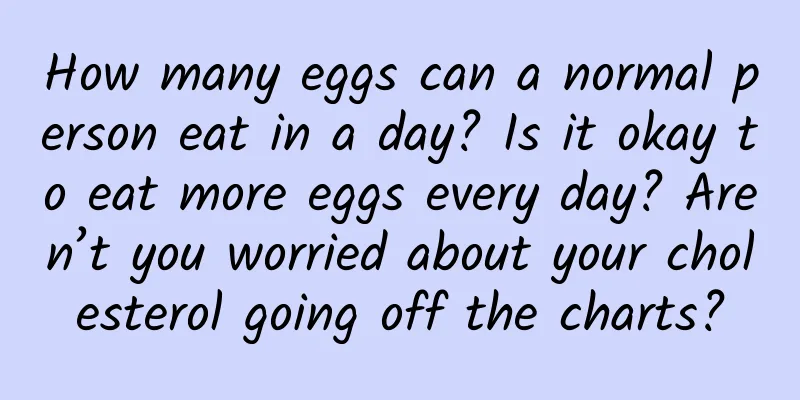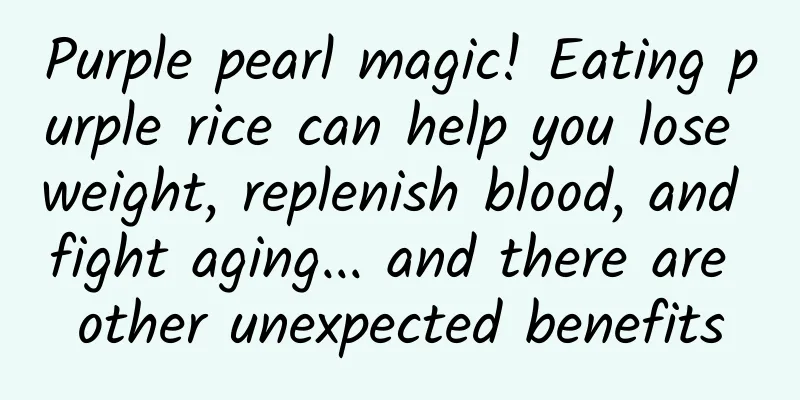How many eggs can a normal person eat in a day? Is it okay to eat more eggs every day? Aren’t you worried about your cholesterol going off the charts?

|
How many eggs can a normal person eat in a day? Is there any problem with eating too many eggs? Order an omelette for breakfast, a poached egg for lunch, tea-scented eggs for afternoon tea, and scrambled eggs with tomatoes as a side dish for dinner... In early 2016, the latest U.S. dietary guidelines removed the upper limit on daily cholesterol intake, allowing many people who used to worry about "eating too many eggs would cause cholesterol to go off the charts" to automatically lift the ban and eat egg dishes without restraint! However, cardiologists remind that eggs should be consumed in moderation, with one egg every two days being enough. Eating too many eggs can easily increase the risk of cancer. Nutritious and delicious! Everyone loves eggs in cookingLiu Zhengwei, a cardiologist at the Songshan Branch of the Tri-Service General Hospital, said that eggs are a good source of high-quality protein and are rich in various minerals and vitamins. The proportion of good oil in their fat composition is quite high, and the unsaturated fatty acid is 4 times that of saturated fatty acid, which poses less burden on health. In addition, it is cheap, delicious, and widely used in cooking, so it has always been one of the favorite ingredients on the Chinese table. Eggs are a good source of high-quality protein and are rich in various minerals and vitamins. The proportion of good oil in their fat composition is quite high. The unsaturated fatty acid is 4 times that of saturated fatty acid, which poses less burden on health. Food cholesterol is banned! Is it okay to eat more eggs?However, in the past, eggs were accused of being landmine foods because their yolks are rich in cholesterol. Eating too much would increase the risk of hyperlipidemia and cardiovascular disease. American experts have set an upper limit of 300 mg of daily cholesterol intake. Eggs come in different sizes, and each egg contains about 200 to 250 mg of cholesterol. A medium-sized egg weighing about 50 grams contains about 200 mg of cholesterol. Since the United States released the latest "Dietary Guidelines 2015-2020" in early January this year, which removed the ceiling limit on cholesterol intake, many egg lovers have been very excited, and even many patients with chronic diseases have "taken chicken feathers as a token of authority" to refute the dietary prescriptions recommended by doctors and nutritionists. Dr. Liu Zhengwei said that removing the upper limit on cholesterol intake does not mean that you can eat eggs without restraint! Although dietary cholesterol does not necessarily directly affect blood cholesterol, it is still important to moderately limit egg intake from a health management perspective. Previous studies have indeed found that people who eat too many eggs have an increased risk of serum cholesterol and certain cancers compared to those who eat less than one egg a week, so we must be cautious. Eat one more egg every day! Be careful of high blood lipids and cancerDr. Liu Zhengwei said that a small-scale prospective study found that if healthy subjects ate one more egg per day than usual, their serum total cholesterol would increase by about 8-12 mg/dl and low-density lipoprotein cholesterol (also known as bad cholesterol, LDL-C) would increase by 6-9 mg/dl after three months. Excessive cholesterol in the blood is called hyperlipidemia. Fatty plaques accumulate over time to form atherosclerosis, further increasing the risk of cardiovascular disease. In addition, the analysis results of a systematic research literature review showed that people who eat more than one egg a day may have a slightly increased risk of breast cancer, ovarian cancer, gastrointestinal tumors, and bladder cancer compared to those who eat less than one egg a week. People who eat more than one egg a day may have a slightly increased risk of breast cancer, ovarian cancer, gastrointestinal cancer, and bladder cancer compared to those who eat less than one egg a week. As for whether eating more eggs will increase the risk of cardiovascular disease? Retrospective literature has shown a dilemma of conflicting opinions. One article believes that eating more eggs will increase the risk of cardiovascular disease, while the analysis results of another article show that the risk of stroke and coronary heart disease does not increase due to eating more eggs. Dr. Liu Zhengwei believes that this may be because the causes of cardiovascular disease are too complex to be explained simply by factors such as eggs or cholesterol. It is worth noting that a subgroup analysis of diabetic patients found that the risk of coronary artery disease and death from heart disease increased with each additional egg they consumed per day. Therefore, diabetics should not eat more than one egg a day. Too much is as bad as too little! One egg every 2 days is just rightAfter all, should eggs be eaten? Dr. Liu Zhengwei emphasized that the public should pay attention to the principle of "too much is as bad as too little". Even if the nutritional value of eggs is high, they should be consumed in moderation. Considering that the risk of eating more than one egg a day may exceed the satisfaction of the appetite, it is recommended to eat one egg every two days to avoid increased blood fat and a slightly increased risk of cancer. |
Recommend
What to do if you get bacterial vaginosis during pregnancy
Many couples have a misunderstanding about women ...
Briefly describe some common symptoms of vaginitis
Vaginitis is a common disease for women, which ca...
Stir-fried bean sprouts with vinegar to remove the bean smell and stewed pig's trotters
[Key points]: Eat more bean sprouts in winter, wh...
What are the causes of recurrent pelvic inflammatory disease?
What causes the recurrence of pelvic inflammatory...
Chewing can control your waistline! 9 weight loss tips revealed
If you think that the digestive tract is simply a...
Sudden unbearable itching in the lower body and abnormal vaginal discharge
Sudden unbearable itching and abnormal vaginal di...
What to do if a girl has irregular menstruation
What should girls do if they have irregular menst...
Experts explain the causes of dysmenorrhea
Dysmenorrhea is a disease that many women are wor...
Does intermittent fasting increase the risk of cardiovascular death? Huang Xuan: Two risk groups should avoid intermittent fasting
The rise in global obesity rates has attracted wi...
10-minute simple fitness yoga (Part 1)
Yoga is a magical health care method that has bee...
Call me the star of tomorrow successfully lost weight and showed off her slim figure
"We are all rising stars!" More than 20...
Even those who eat out can eat healthily at convenience stores! Follow the nutritionist to eat healthy meals without gaining weight
Busy office workers can just buy a bento and a dr...
Detailed explanation of the symptoms of vaginitis
Vaginitis is an inflammation of the vagina caused...
Is vulvar leukoplakia vitiligo?
Vulvar leukoplakia, also known as female vulvar l...
Expert advice: Treatment of cervicitis
As a common disease among women of childbearing a...









